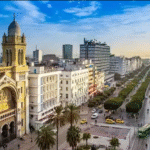A Detailed Comparison for Retirees
Introduction
Retiring abroad is an exciting prospect, especially when considering countries like Tunisia, which offer a lower cost of living, warm weather, and rich cultural experiences. For UK retirees, understanding the financial differences between Tunisia and the UK is crucial for making an informed decision.
This guide provides a detailed cost comparison between Tunisia and the UK, covering housing, healthcare, groceries, transportation, and leisure activities. Whether you’re looking for an affordable retirement destination or simply curious about the financial benefits, this breakdown will help you plan effectively.
1. Housing Costs: Tunisia vs. the UK
Buying Property
- Tunisia: Property prices are significantly lower than in the UK. A modern apartment in Tunis or coastal cities like Sousse or Hammamet can cost £50,000–£150,000, while a luxury villa may range from £200,000–£500,000.
- UK: The average house price in the UK is around £290,000, with London and the South East being much more expensive.
Renting Property
- Tunisia: A one-bedroom apartment in a city center costs £200–£400/month, while a three-bedroom villa near the coast may be £500–£1,000/month.
- UK: Renting a one-bedroom apartment in London averages £1,500–£2,500/month, while outside major cities, it’s £700–£1,200/month.
Verdict: Tunisia offers 50–70% lower housing costs compared to the UK.
2. Healthcare: Public vs. Private Options
Public Healthcare
- Tunisia: Public healthcare is affordable but basic. Expats often opt for private insurance, which costs £20–£50/month.
- UK: The NHS provides free healthcare, but retirees may face long waiting times for non-emergency treatments.
Private Healthcare
- Tunisia: Private hospitals offer high-quality care at a fraction of UK prices. A doctor’s visit costs £15–£30, and dental work is 50–70% cheaper.
- UK: Private health insurance can cost £100–£300/month, with consultations starting at £60–£150.
Verdict: Tunisia’s private healthcare is far more affordable than the UK’s.
3. Groceries & Daily Expenses
Food Prices
| Item | Tunisia (Price in £) | UK (Price in £) |
|---|---|---|
| Bread (1 loaf) | £0.20–£0.50 | £1.00–£1.50 |
| Milk (1L) | £0.50–£0.80 | £1.00–£1.50 |
| Eggs (12) | £1.00–£1.50 | £2.00–£3.50 |
| Chicken (1kg) | £2.50–£4.00 | £5.00–£7.00 |
| Fresh Fish (1kg) | £4.00–£8.00 | £10.00–£20.00 |
Dining Out
- Tunisia: A meal at a mid-range restaurant costs £5–£10, while a three-course meal for two is £15–£30.
- UK: A similar meal costs £30–£60 in a mid-range restaurant.
Verdict: Groceries and dining are 50–70% cheaper in Tunisia.
4. Transportation: Public vs. Private
Public Transport
- Tunisia: Buses and trains are very affordable. A monthly pass costs £10–£20, and taxis are £0.30–£0.50 per km.
- UK: A monthly transport pass in London is £150–£250, and taxis cost £1.50–£3.00 per km.
Car Ownership
- Tunisia: Petrol costs £0.80–£1.00 per litre, and car insurance is £200–£500/year.
- UK: Petrol is £1.50–£1.80 per litre, and insurance averages £500–£1,200/year.
Verdict: Transport costs in Tunisia are 60–80% lower than in the UK.
5. Leisure & Entertainment
Gym Memberships
- Tunisia: £15–£30/month
- UK: £30–£80/month
Cinema Tickets
- Tunisia: £3–£6
- UK: £10–£15
Beach Clubs & Resorts
- Tunisia: A day pass at a luxury beach resort costs £15–£30.
- UK: Similar experiences cost £50–£100+.
Verdict: Leisure activities are 50–70% cheaper in Tunisia.
6. Taxes & Retirement Benefits
Pension Taxation
- Tunisia: No tax on foreign pensions for the first 10 years under certain residency schemes.
- UK: Pensions are taxable, with rates up to 45% for high earners.
Property Taxes
- Tunisia: Low annual property taxes (£50–£200).
- UK: Council tax averages £1,500–£3,000/year.
Verdict: Tunisia offers significant tax advantages for retirees.
Conclusion: Is Tunisia Cheaper Than the UK for Retirees?
✅ Housing: 50–70% cheaper
✅ Healthcare: Affordable private options
✅ Groceries & Dining: 50–70% savings
✅ Transportation: 60–80% lower costs
✅ Leisure & Taxes: More affordable lifestyle
For UK retirees, Tunisia presents a cost-effective alternative with a high quality of life, Mediterranean climate, and rich cultural experiences. By relocating, retirees can stretch their pensions further while enjoying a relaxed, sunny lifestyle.
Next Steps for Retiring in Tunisia
- Research visa and residency options.
- Visit Tunisia to explore preferred cities.
- Consult financial advisors for tax planning.
Would you consider retiring in Tunisia? Share your thoughts in the comments!


